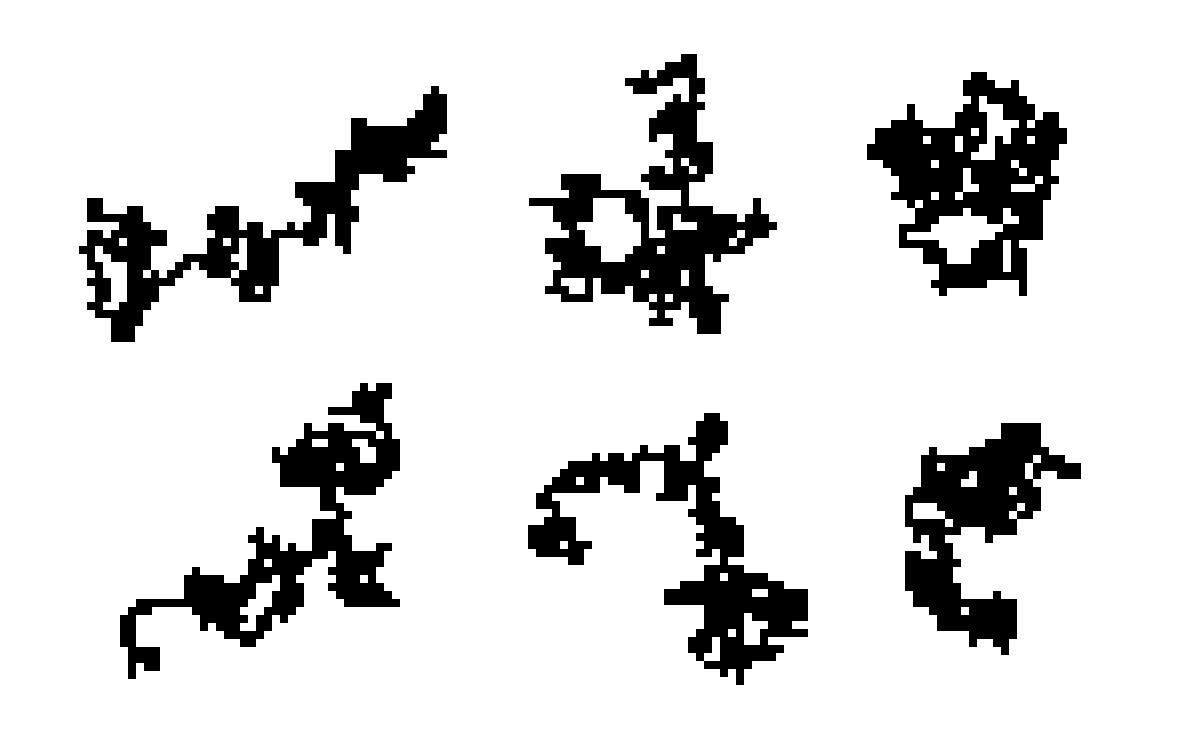A modern library for procedural content generation
// math and algorithms
#include <simulacrum/random_walks.hpp>
#include <random>
#include <algorithm>
// data types and type constraints
#include <glm/glm.hpp>
#include <cstdint>
#include <spatula/geometry.hpp>
// i/o
#include <iostream>
namespace ranges = std::ranges;
namespace sim = simulacrum;
void print_point(glm::ivec2 const & p)
{
std::cout << "(" << p.x << ", " << p.y << ")" << std::endl;
}
int main()
{
// -- create resources for the walk --
// we'll need to make our own random engine
std::random_device seed;
std::mt19937 rng(seed());
glm::ivec2 const origin(0, 0);
// reserve enough space for all the points
std::uint32_t const N = 5;
std::vector<glm::ivec2> points;
points.reserve(N);
auto into_points = std::back_inserter(points);
// -- perform the simulation --
using cardinal = sp::direction::cardinal;
ranges::generate_n(into_points, N, sim::uniform_walk<cardinal>(rng, origin));
ranges::for_each(points, print_point);
}Possible output:
(0, 1)
(1, 1)
(0, 1)
(0, 0)
(0, -1)
- A compiler for C++20 or newer
spatulalibrary
Since this is a header-only library, all you really need to do is to make sure that the compiler can see the include path that has the source code. Alternatively, you can build it with cmake:
mkdir build
cd build
cmake ..
sudo cmake --install .If you're on windows, you'll need to run cmake --install . as adminsitrator
instead of using sudo.
At this point, if you're using cmake, you can add this to your CMakeLists.txt
find_package(simulacrum REQUIRED)
...
target_link_libraries(<target> INTERFACE sim::simulacrom)Simulate a random walk.
template<sp::ranged_enum Direction,
std::uniform_random_bit_generator Engine,
sp::vector2 Vector,
class Distribution>
class random_walk {
public:
random_walk(Engine & rng, Vector const & start,
Distribution const & sample_space);
Vector operator()();
};A function object that takes no arguments and advances the walk's position, returning the previous position.
rngthe random number generatorstartthe starting position of the walksample_spacethe direction distribution to use when walking
#include <random>
#include <SFML/System.hpp>
#include <spatula/geometry.hpp>
#include <simulacrum/random_walks.hpp>
// ...
std::random_device seed;
std::mt19937 rng(seed());
sf::Vector2i const start(100, 100);
using direction_distribution = std::discrete_distribution<std::uint32_t>;
direction_distribution sample_direction{3, 2, 1, 1};
std::uint32_t const N = 100;
std::vector<sf::Vector2i> points;
points.reserve(N);
auto into_points = std::back_inserter(points);
using cardinal = sp::direction::cardinal;
ranges::generate_n(into_points, N,
sim::random_walk<cardinal>(rng, start, sample_direction));Simulate a uniform random walk
template<std::uniform_random_bit_generator Engine, sp::vector2 Vector>
auto uniform_walk(Engine & rng, Vector const & start);A random_walk function object with a std::uniform_int_distribution as its
sample space.
rngthe random number generator to sample fromstartwhere the random walk should start from
#include <glm/glm.hpp>
#include <spatula/geometry.hpp>
#include <simulacrum/random_walks.hpp>
namespace sim = simulacrum;
// ...
std::random_device seed;
std::mt19937 rng(seed());
glm::ivec2 const origin(0, 0);
std::array<glm::ivec2, 10> points;
using cardinal = sp::direction::cardinal;
ranges::generate(points, sim::uniform_walk<cardinal>(rng, origin));